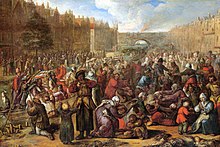
Back Geuse (Tagtigjarige Oorlog) Afrikaans Gözlər (tarixi termin) Azerbaijani Гёзы Byelorussian Гьози Bulgarian Geuzen Catalan Gézové Czech Geusen German Geŭzo Esperanto Göösid Estonian Geuzen Basque


Geuzen (Dutch pronunciation: [ˈɣøːzə(n)]; lit. 'The Beggars'; French: Les Gueux) was a name assumed by the confederacy of Calvinist Dutch nobles, who from 1566 opposed Spanish rule in the Netherlands. The most successful group of them operated at sea, and so were called Watergeuzen (Dutch pronunciation: [ˈʋaːtərɣøːzə(n)]; lit. 'Water Beggars'; French: Gueux de mer). In the Eighty Years' War, the Capture of Brielle by the Watergeuzen in 1572 provided the first foothold on land for the rebels, who would conquer the northern Netherlands and establish an independent Dutch Republic. They can be considered either as privateers or pirates, depending on the circumstances or motivations.[1][2]
- ^ Pennell, C. R. (2001). Bandits at sea: a pirates reader. NYU Press. p. 101 Note 28. ISBN 9780814766781. Retrieved 2013-08-11.
- ^ Rasor, Eugene L. (2004). English/British naval history to 1815: a guide to the literature. Bloomsbury Academic. p. 247. ISBN 9780313305474.
© MMXXIII Rich X Search. We shall prevail. All rights reserved. Rich X Search